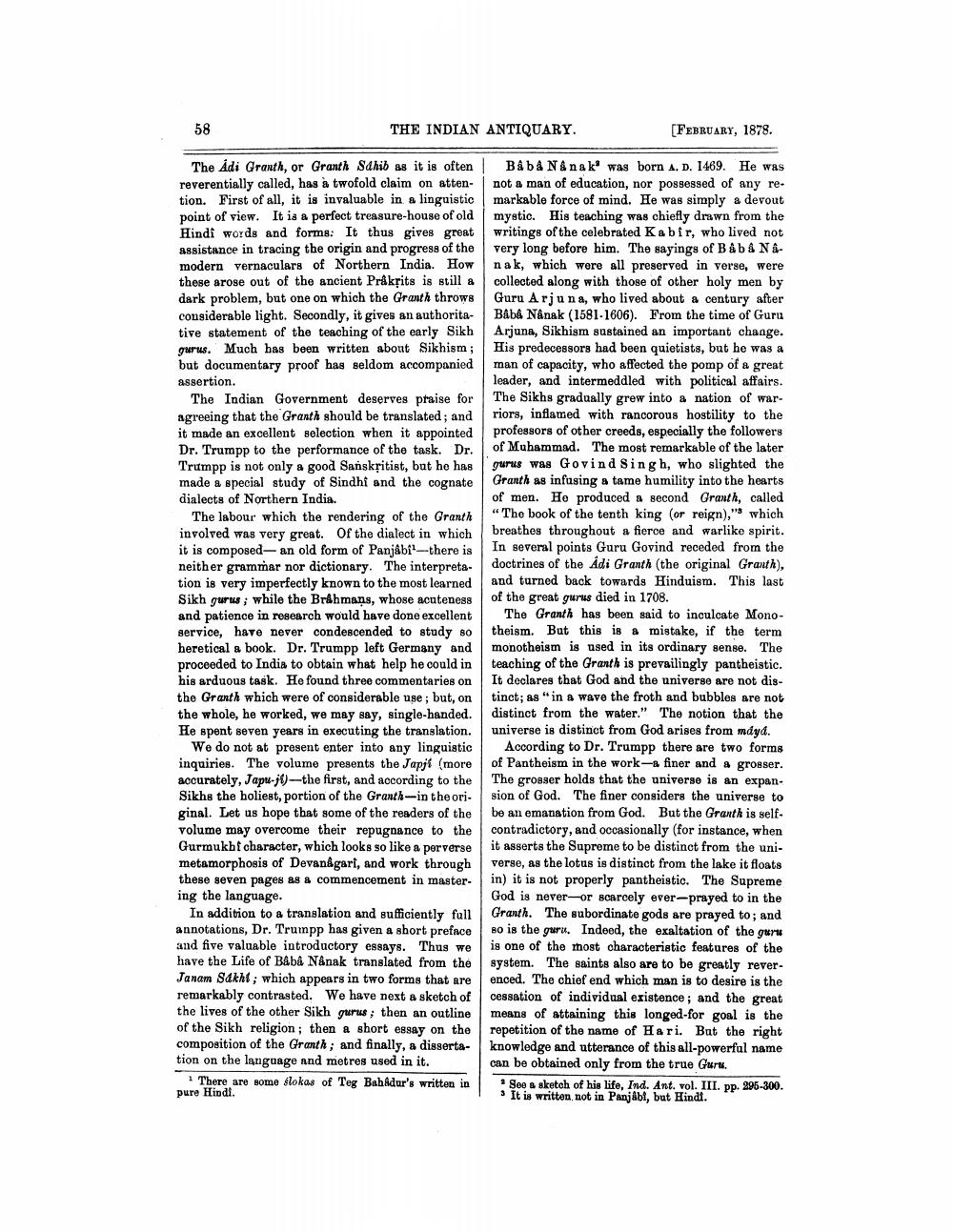________________
58
THE INDIAN ANTIQUARY.
[FEBRUARY, 1878.
The Adi Granth, or Granth Sahib as it is often Baba Nanak' was born A. D. 1469. He was reverentially called, has a twofold claim on atten- | not a man of education, nor possessed of any retion. First of all, it is invaluable in a linguistic markable force of mind. He was simply a devout point of view. It is a perfect treasure-house of old mystic. His teaching was chiefly drawn from the Hindi words and forms. It thus gives great writings of the celebrated Kabir, who lived not assistance in tracing the origin and progress of the very long before him. The sayings of B&b & NAmodern vernaculars of Northern India. How nak, which were all preserved in verse, were these arose out of the ancient Pråkpits is still & collected along with those of other holy men by dark problem, but one on which the Granth throws Guru Arjuna, who lived about a century after considerable light. Secondly, it gives an authorita- Baba Nanak (1581-1606). From the time of Guru tive statement of the teaching of the early Sikh Arjuna, Sikhism sustained an important change. gurus. Much has been written about Sikhism; His predecessors had been quietists, but he was a but documentary proof has seldom accompanied man of capacity, who affected the pomp of a great assertion.
leader, and intermeddled with political affairs. The Indian Government deserves praise for The Sikhs gradually grew into a nation of war. agreeing that the Granth should be translated; and riors, inflamed with rancorous hostility to the it made an excellent selection when it appointed professors of other creeds, especially the followers Dr. Trumpp to the performance of the task. Dr.
of Muhammad. The most remarkable of the later Trumpp is not only a good Sanskṣitist, but he has gurus was Govind Singh, who slighted the made a special study of Sindhi and the cognate Granth as infusing a tame humility into the hearts dialects of Northern India.
of men. Ho produced a second Granth, called The labour which the rendering of the Granth "The book of the tenth king (or reign)," which involved was very great. Of the dialect in which breathes throughout a fierce and warlike spirit. it is composed- an old form of Panjabi - there is
In several points Guru Govind receded from the neither grammar nor dictionary. The interpreta
doctrines of the Adi Granth (the original Granth), tion is very imperfectly known to the most learned and turned back towards Hinduism. This last Sikh gurus; while the Brahmans, whose acuteness of the great gurus died in 1708. and patience in research would have done excellent The Granth has been said to inculcate Monoservice, have never condescended to study 80 theism. But this is a mistake, if the term heretical a book. Dr. Trumpp left Germany and monotheism is used in its ordinary sense. The proceeded to India to obtain what help he could in teaching of the Granth is prevailingly pantheistic. his arduous task. He found three commentaries on It declares that God and the universe are not disthe Granth which were of considerable uge, but, on tinct; as "in a wave the froth and bubbles are not the whole, he worked, we may say, single-handed. distinct from the water." The notion that the He spent seven years in executing the translation. universe is distinct from God arises from mdyd.
We do not at present enter into any linguistic According to Dr. Trumpp there are two forms inquiries. The volume presents the Japji (more of Pantheism in the work-a finer and a grosser. accurately, Japu-jf)--the first, and according to the The grosser holds that the universe is an expanSikhs the holiest, portion of the Granth-in the ori. sion of God. The finer considers the universe to ginal. Let us hope that some of the readers of the be an emanation from God. But the Granth is selfvolume may overcome their repugnance to the contradictory, and occasionally (for instance, when Gurmukhi character, which looks so like a perverse it asserts the Supreme to be distinct from the unimetamorphosis of Devanagari, and work through verse, as the lotus is distinct from the lake it floats these seven pages as & commencement in master- in) it is not properly pantheistic. The Supreme ing the language.
God is never-or scarcely ever-prayed to in the In addition to a translation and sufficiently full Granth. The subordinate gods are prayed to; and annotations, Dr. Trumpp has given a short preface so is the guru. Indeed, the exaltation of the guru and five valuable introductory essays. Thus we is one of the most characteristic features of the have the Life of Bâbâ N&nak translated from the system. The saints also are to be greatly reverJanam Sakht; which appears in two forms that are enced. The chief end which man is to desire is the remarkably contrasted. We have next a sketch of cessation of individual existence; and the great the lives of the other Sikh gurus ; then an outline means of attaining this longed-for goal is the of the Sikh religion; then a short essay on the repetition of the name of Hari. But the right composition of the Granth; and finally, a disserta- knowledge and utterance of this all-powerful name tion on the language and metres used in it.
can be obtained only from the true Guru There are some slokas of Teg Bahadur's written in See a sketch of his life, Ind. Ant. vol. III. pp. 296-300. pure Hindi.
3 It is written not in Panjabt, but Hindi.




